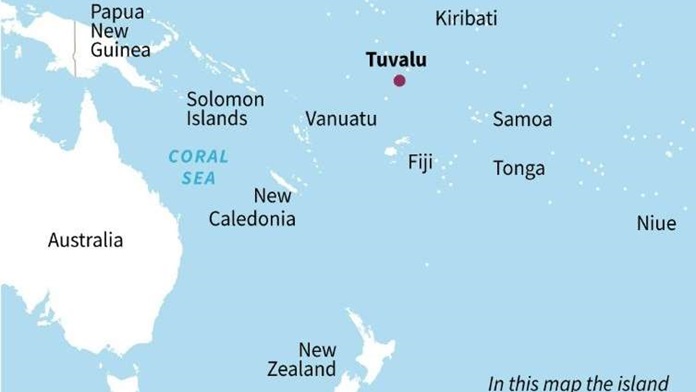Labor is framing its new treaty with the tiny Pacific nation of Tuvalu, which will allow 280 people a year to move to Australia, as an act of climate change solidarity.
But the primary motivation is to strengthen Australian influence in the South Pacific and block China’s search for allies.
Behind the climate rhetoric, the new treaty gives Australia a veto over Tuvalu’s ability to make any “any partnership, arrangement or engagement with any other State or entity on security and defence-related matters.
“Such matters include but are not limited to defence, policing, border protection, cyber security and critical infrastructure, including ports, telecommunications and energy infrastructure.”
The treaty comes 19 months after China signed a security pact with the Solomon Islands—a move that sparked panic in the Australian ruling class, which regards the region as its own.
Prime Minister Anthony Albanese and Tuvaluan Prime Minister Kausea Natano announced the agreement at the Pacific Islands Forum meeting in the Cook Islands, with Australia making it clear the option was open for other countries in the region to sign similar agreements.
Falepili Union
Tuvalu, a British colony until 1978, consists of nine islands about halfway between Australia and Hawaii. It has a population of about 11,200 and, at its highest, is just 4.6 metres above sea level.
Albanese said that Tuvalu’s “very existence is threatened. I believe developed nations have a responsibility to provide assistance”.
Under the treaty or Falepili Union (based on a Tuvaluan word for neighbourliness), Australia will offer Tuvaluans a “human mobility pathway” to allow them to live, study and work in Australia, with access to education, health, and income and family support on arrival.
The two countries also commit “to work together in the face of the existential threat posed by climate change”. Australia will spend $16.9 million to expand land areas of Tuvalu’s main islands by 6 per cent.
But these are empty gestures while the Albanese government continues to approve new coal and gas projects.
As the Tuvalu Climate Action Network points out, Australia is failing “to effectively address the root cause of Tuvalu’s existential threat—the devastating impacts of climate change primarily driven by the combustion of fossil fuels …
“Offering residence or citizenship rights to Tuvaluans, though a compassionate response, does not halt the inexorable rise in sea levels.”
Academics Taukiei Kitara and Carol Farbotko report that many Tuvaluans have no interest in leaving their homes.
They write, “Research indicates that, with adaptation measures, the habitability of atolls can continue into the 21st century, despite rising sea levels … The treaty should not be interpreted as an indication that the worst-case scenario has arrived or is imminent.”
They add, “Our gravest concerns about the treaty are that it sidesteps the important question of Australia’s commitment to phasing out fossil fuels.”
While Australia should open its borders to climate refugees, the priority should be to stop global heating.
But Labor refuses to rule out new fossil fuel projects because of the massive role coal, gas and oil play in the Australian economy. In 2022, coal exports alone were worth a massive $142 billion.
Cold calculation
Behind Labor’s posturing about climate solidarity is a cold calculation about the importance of binding Tuvalu to Australia and preventing China extending its influence.
Tuvalu’s land mass is tiny but its exclusive economic zone is almost 750,000 square kilometres—similar in size to NSW.
It is currently one of the few countries in the Pacific that still maintains a diplomatic relationship with Taiwan, rather than China.
Nine countries have switched allegiance to China since 2016, leaving Taiwan with just 13 allies worldwide.
Now Australia wants to lock island nations into treaties in order to lock out China.
As Solidarity reported when the Solomon Islands signed a security agreement with China in April 2022, establishment commentators warned the deal “would give the People’s Liberation Army navy an operating base deep within Australia’s strategic hinterland” and “would signal a pretty significant failure of Australia’s long-term security policy”.
Albanese and Foreign Minister Penny Wong have been working hard since then to ensure China makes no further progress.
Vast areas of the globe are in play. Professor Jack Corbett from Monash University wrote in The Age, “The language of ‘union’ signals that the government hopes other countries, especially Kiribati and Nauru, might be open to a similar deal. If they are, then the map of the Pacific would suddenly look quite different.
“The US would maintain strategic denial in the North Pacific via Guam, its Commonwealth with the neighbouring Mariana Islands, and its Compacts of Free Association with Palau, Federated States of Micronesia and Marshall Islands.
“Tokelau is a dependent territory of New Zealand, which also has a free association arrangement with Cook Islands and Niue, and longstanding links with Samoa. France retains French Polynesia and New Caledonia.
“If the Falepili Union were to include Kiribati and Nauru as well as Tuvalu, then the North, Central and South Pacific would all comprise territories friendly to Australia that protect our air and sea-lanes from a Chinese approach.”
Regional power
Australia has been the regional power in the South Pacific since the 19th century.
From the point of view of Australian capitalism, it is crucial to control the shipping lanes that run through the region.
Malcolm Fraser’s Coalition government quadrupled aid to island nations in 1976 as a direct response to the feelers the Soviet Union was extending to some of the newly-independent island nations.
Today, our rulers fear interference by China—ignoring, of course, the much more substantial stake in the Pacific held by the US and France.
The treaty with Tuvalu pays lip service to humanitarian aims but is, in reality, another step by Australia to shore up its power.
Ordinary people in Australia and Tuvalu have nothing to gain from this rivalry. Instead we need to unite for real action on climate change.
By David Glanz






